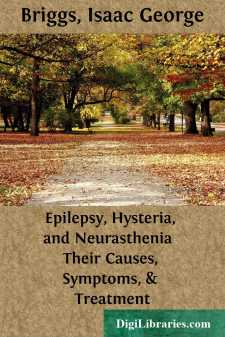Categories
- Antiques & Collectibles 13
- Architecture 36
- Art 48
- Bibles 22
- Biography & Autobiography 813
- Body, Mind & Spirit 142
- Business & Economics 28
- Children's Books 15
- Children's Fiction 12
- Computers 4
- Cooking 94
- Crafts & Hobbies 4
- Drama 346
- Education 46
- Family & Relationships 57
- Fiction 11829
- Games 19
- Gardening 17
- Health & Fitness 34
- History 1377
- House & Home 1
- Humor 147
- Juvenile Fiction 1873
- Juvenile Nonfiction 202
- Language Arts & Disciplines 88
- Law 16
- Literary Collections 686
- Literary Criticism 179
- Mathematics 13
- Medical 41
- Music 40
- Nature 179
- Non-Classifiable 1768
- Performing Arts 7
- Periodicals 1453
- Philosophy 64
- Photography 2
- Poetry 896
- Political Science 203
- Psychology 42
- Reference 154
- Religion 513
- Science 126
- Self-Help 84
- Social Science 81
- Sports & Recreation 34
- Study Aids 3
- Technology & Engineering 59
- Transportation 23
- Travel 463
- True Crime 29
Epilepsy, Hysteria, and Neurasthenia Their Causes, Symptoms, & Treatment
Categories:
Description:
Excerpt
EPILEPSY, HYSTERIA, AND NEURASTHENIA
CHAPTER I
MAJOR AND MINOR EPILEPSY
(Grand and Petit Mal)
"My son is sore vexed, for ofttimes he falleth into the fire, and ofttimes into the water."—Matthew xvii, 15.
"Oft, too, some wretch before our startled sight,
Struck as with lightning with some keen disease,
Drops sudden: By the dread attack o'erpowered
He foams, he groans, he trembles, and he faints;
Now rigid, now convuls'd, his labouring lungs
Heave quick, and quivers each exhausted limb.
* * * * *
"He raves, since Soul and Spirit are alike
Disturbed throughout, and severed each from each
As urged above, distracted by the bane;
But when at length the morbid cause declines,
And the fermenting humours from the heart
Flow back—with staggering foot first treads
Led gradual on to intellect and strength."—Lucretius.
Epilepsy, or "Falling Sickness", is a chronic abnormality of the nervous system, evinced by attacks of alteration of consciousness, usually accompanied by convulsions.
It attacks men of every race, as well as domesticated animals, and has been known since the earliest times, the ancients imputing it to demons, the anger of the gods, or a blow from a star.
It often attacks men in crowds, when excited by oratory or sport, hence the Roman name: morbus comitialis (crowd sickness).
In mediæval times, sufferers were regarded with awe, as being possessed by a spirit. Witch doctors among savages, and founders and expounders of differing creeds among more civilized peoples, have taken advantage of this infirmity to claim divine inspiration, and the power of "seeing visions" and prophesying.
Epilepsy has always interested medical men because of its frequency, the difficulty of tracing its cause, and its obstinacy to treatment, while it has appealed to popular imagination by the appalling picture of bodily overthrow it presents, so that many gross superstitions have grown up around it.
The description in Mark ix. 17-29, is interesting:
"Master, I have brought Thee my son, which hath a dumb spirit. And wheresoever he taketh him, he teareth him: and he foameth, and gnasheth with his teeth, and pineth away: ... straightway the spirit tare him; and he fell on the ground, and wallowed foaming."And He asked his father, How long is it ago since this came unto him? And he said, Of a child. And ofttimes it hath cast him into the fire, and into the waters, to destroy him."And he said unto them, This kind can come forth by nothing, but by prayer and fasting."Up to the present, epilepsy can be ascribed to no specific disease of the brain, the symptoms being due to some morbid disturbance in its action. Epilepsy is a "functional" disease.
GRAND MAL ("Great Evil")
An unusual feeling called an aura (Latin—vapour), sometimes warns a patient of an impending fit, commonly lasting long enough to permit him to sit or lie down. This is followed by giddiness, a roaring in the ears, or some unusual sensation, and merciful unconsciousness. In many cases this stage is instantaneous; in others it lasts some seconds—but an eternity to the sufferer....


